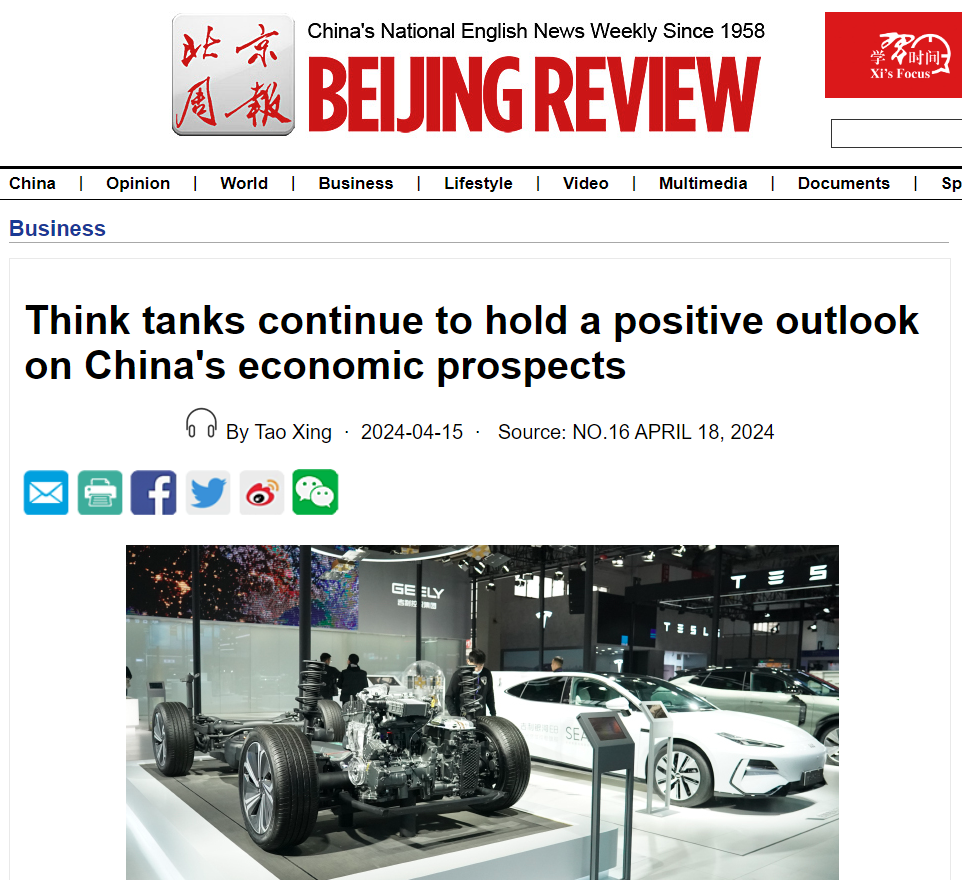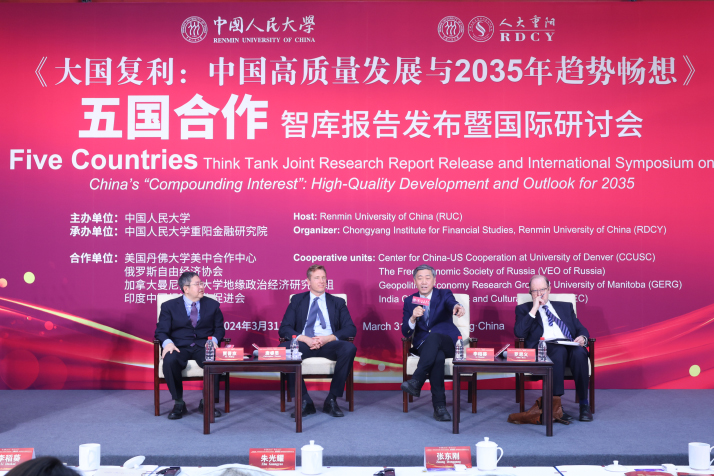LATEST INSIGHTS
Your Present Location: LATEST INSIGHTS[RDCY Report] Think tanks continue to hold a positive outlook on China's economic prospects
Source: Beijing Review Published: 2024-04-15

China is projected to become the world's largest economy, with its GDP surpassing that of the United States, by 2035. Two underlying reasons here are the country's faster economic growth and its more internationalized currency.
The ambitious forecast is one of the 10 predictions outlined for China over the coming decade in a research report titled China's 'Compounding Interest': High-Quality Development and Outlook for 2035.
The report was jointly released by the Chongyang Institute for Financial Studies at Renmin University of China, along with four other think tanks from the United States, Russia, India and Canada, during a symposium on March 31.
In recent years, China has achieved notable feats in high-quality economic and social development. These achievements are 'a manifestation of China's 'compounding interest',' the report read.
Interest on interest
According to the report, 'compounding interest' is a useful tool for wealth growth, asset preservation, as well as asset appreciation. The momentum of China's modernization, characterized by the development of 'compounding interest,' focuses on taking innovation-driven initiatives, deepening reforms, expanding opening up and promoting green development.
With enormous potential, this development model can sustainably drive the country's economic growth and promote prosperity in the long term, it said.
In simple finance terms, 'compound interest' is interest on interest. But the notion does not simply mean what it does in financial jargon, namely, that your financial assets are growing almost exponentially, William Jones, former Washington Bureau Chief of U.S. weekly magazine Executive Intelligence Review, told the symposium via video link.
'But what the term seems to mean in this context is much broader and attempts to convey the sense that the directionality of development of the Chinese economy is not simply linear growth, but rather the expansion of the possibilities for society as well as for the individual Chinese citizen to reach every higher platform of development and self-realization,' Jones added.
The concept of 'compounding interest' in large countries has a similar meaning to the concept of 'endogenous growth' in economics, Li Daokui, Director of the Academic Center for Chinese Economic Practice and Thinking at Tsinghua University in Beijing, said at the symposium. The endogenous growth theory is an economic theory which argues that economic growth is primarily driven by internal factors such as human capital, technological innovation and knowledge accumulation.
According to Li, the endogenous growth of China's economy is reflected in two aspects: First, China has a complete industrial chain and huge industrial scale; second, it features a rapid innovation speed. Additionally, China adds approximately 4.4 million engineers every year, which brings huge innovation power to the country, Li added.

The 2035 vision
China needs to rely on its sustained and 'compounding interest' to achieve its 2035 vision, with the help of the gradual realization of high-quality development, and to cultivate and develop new quality productive forces, the report said.
In the bigger context of the country's economic development, new quality productive forces represent enhanced productivity that moves beyond traditional economic growth models and paths of productivity development. These forces emphasize hi-tech solutions, efficiency and quality, aligning with the principles of China's high-quality development philosophy.
The report first illustrates China's development in 2035 in 10 concrete manifestations from the perspective of think tanks. In addition to the first one mentioned at the beginning of this article, the other nine aspects include:
The per-capita disposable income of Chinese residents is likely to double compared to that recorded in 2023. Last year, the national disposable income per capita was 39,218 yuan ($5,420).
The population proportion of the middle-income group will increase from one third to nearly half, with the middle-income group's daily per-capita consumption ranging from $10 to $100 at 2005 purchasing power parity (PPP) prices. (PPP is an important concept in economics and international finance because it provides a framework for comparing the relative value of currencies and standard of living between countries.)
Every three households will have an average of one new-energy vehicle. (In China, new-energy vehicles refer to vehicles completely or mainly driven by new energy sources, including battery electric vehicles, plug-in hybrid vehicles and fuel cell vehicles.)
China is positioned to play a significant role in upholding international peace and fostering stability in the global order.
More residents will participate in international exchange and the number of countries reaching agreements with China on mutual visa exemption, unilateral visa exemption and visa-on-arrival, will rise from over 80 to over 120 countries.
China will peak its carbon dioxide emissions ahead of schedule (before 2030) and will be the country with the most annual nominal carbon emission reductions.
Over 200 Chinese companies will feature on the Fortune Global 500 list, lifting the global competitiveness of Chinese enterprises to new heights.
China will become one of the world's most mature capital markets as A-shares grow steadily. (A-shares refer to shares of Chinese mainland companies listed on the Shanghai and Shenzhen stock exchanges and are denominated in renminbi).
The Belt and Road Initiative (BRI), first proposed by China in 2013 to boost connectivity along and beyond the ancient Silk Road routes, will achieve breakthroughs around its 20th anniversary and become the world's largest cooperation initiative in terms of participating countries and economic scale.
Promoting globalization
The attending experts at the symposium also shared their perspectives on China and its global impact.
'China has a bright future,' Christopher Thomas, a non-resident senior fellow at U.S. think tank Brookings Institution, said, adding that China has 'a large population, a very large market, very smart and hardworking people and a solid industrial foundation.'
But he also pointed out that China should further improve its innovation capacity. Domestic companies need to upgrade their use of artificial intelligence and other new technologies, as well as transition from a primarily hardware-based model to a software- and services-based technological model, he added.
Li stated that China is more adept at 'scaling from 1 to 1 million' compared to 'building from 0 to 1.' The former involves leveraging existing industrial chains to create economies of scale, while the latter entails introducing entirely new concepts or innovations from the ground up—an area where Li feels the U.S. has historically excelled over China.
He emphasized the importance of collaboration between China and the U.S. for mutual benefit as well as for the greater good of the global community.
Other experts also highlighted how China's 'compounding interest' is bringing new opportunities to the world.
After substantial Chinese investments in infrastructure through the BRI, recent developments indicate a higher level of cooperation between China and developing countries, Marco Fernandes, a researcher at the Tricontinental Institute for Social Research, said at the symposium, adding that numerous partnerships between Chinese state-owned and private companies with countries in the Global South have been established recently, many of them related to the local processing of critical minerals or the production of electric vehicles. The Global South refers to the nations of the world that are considered to have a relatively low level of economic and industrial development and are typically located to the south of more industrialized nations.
For example, China is investing billions of dollars in lithium processing plants in Bolivia, another lithium plant and one mega steel plant in Zimbabwe, a nickel processing plant in Indonesia, and an electric vehicle battery manufacturing hub in Morocco. Mexico and Brazil are building Chinese-invested electric vehicle factories, according to Fernandes.
'China is holding out the option of continued global economic development by its laser-like focus on a technology-driven course,' Jones said. 'Without the engine provided by the Chinese economy and the political commitment to maintain a world of peace and development, the rest of the world would be in a much worse situation than it is at the moment.'























































































 京公网安备 11010802037854号
京公网安备 11010802037854号





